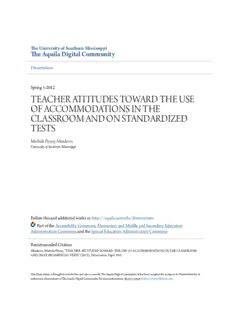Table Of ContentTThhee UUnniivveerrssiittyy ooff SSoouutthheerrnn MMiissssiissssiippppii
TThhee AAqquuiillaa DDiiggiittaall CCoommmmuunniittyy
Dissertations
Spring 5-2012
TTeeaacchheerr AAttttiittuuddeess TToowwaarrdd tthhee UUssee ooff AAccccoommmmooddaattiioonnss iinn tthhee
CCllaassssrroooomm aanndd oonn SSttaannddaarrddiizzeedd TTeessttss
Michele Penny Meadows
University of Southern Mississippi
Follow this and additional works at: https://aquila.usm.edu/dissertations
Part of the Accessibility Commons, Elementary and Middle and Secondary Education Administration
Commons, and the Special Education Administration Commons
RReeccoommmmeennddeedd CCiittaattiioonn
Meadows, Michele Penny, "Teacher Attitudes Toward the Use of Accommodations in the Classroom and
on Standardized Tests" (2012). Dissertations. 810.
https://aquila.usm.edu/dissertations/810
This Dissertation is brought to you for free and open access by The Aquila Digital Community. It has been accepted
for inclusion in Dissertations by an authorized administrator of The Aquila Digital Community. For more
information, please contact [email protected].
The University of Southern Mississippi
TEACHER ATTITUDES TOWARD THE USE OF ACCOMMODATIONS IN THE
CLASSROOM AND ON STANDARDIZED TESTS
by
Michele Penny Meadows
Abstract of a Dissertation
Submitted to the Graduate School
of The University of Southern Mississippi
in Partial Fulfillment of the Requirements
for the Degree of Doctor of Philosophy
May 2012
ABSTRACT
TEACHER ATTITUDES TOWARD THE USE OF ACCOMMODATIONS IN THE
CLASSROOM AND ON STANDARDIZED TESTS
by Michele Penny Meadows
May 2012
Educating students with disabilities in the least restrictive environment
necessitates the use of accommodations and modifications to help these students have
better access to the general education curriculum. As a result of inclusion, general
education teachers are required to teach students with disabilities in their general
education classrooms. Even though regular education teachers have assistance from
special education teachers, not all general education teachers (and some special education
teachers) believe they have the education, experience, or support to teach these students
effectively. This study measured general education teacher and special education teacher
attitudes toward the use accommodations for special education students in the regular
education classroom and in standardized testing situations. A likert-type survey
instrument was used to collect data from general education teachers and special education
teachers in public schools containing grades K-12 in south Mississippi schools. The data
collected through the study showed varying attitudes among teachers. When teacher
attitudes were compared by position (regular education or special education teacher),
there was a statistically significant difference in attitudes with special education teacher
attitudes being more positive in both the classroom and on standardized tests. Teacher
attitudes by grade level taught and position did not differ significantly in either the
classroom or on standardized tests. Teachers with a master’s degree or higher did not
ii
have a more positive attitude toward the use of accommodations in the classroom, but
teachers with a master’s degree or higher did have a more positive attitude toward the use
of accommodations on standardized tests. Teachers with 16 or more years experience
tended to have more positive attitudes toward the use of accommodations than those with
lower levels of experience both in the classroom and on standardized tests. Teachers at
the elementary level had a more positive attitude toward the use of accommodations in
the classroom but on standardized tests there was not a statistical difference. Teacher
attitudes were more positive toward the use of accommodations in the classroom than
toward the use of accommodations on standardized tests.
iii
COPYRIGHT BY
MICHELE PENNY MEADOWS
2012
The University of Southern Mississippi
TEACHER ATTITUDES TOWARD THE USE OF ACCOMMODATIONS IN THE
CLASSROOM AND ON STANDARDIZED TESTS
by
Michele Penny Meadows
A Dissertation
Submitted to the Graduate School
of The University of Southern Mississippi
in Partial Fulfillment of the Requirements
for the Degree of Doctor of Philosophy
Approved:
David Lee___________________________
Director
J. T. Johnson_________________________
Ron Styron _________________________
Rose McNeese_______________________
Susan A. Siltanen_____________________
Dean of the Graduate School
May 2012
DEDICATION
I would like to thank my husband, Steve, for believing I could do this and
continuing to encourage and support me throughout the process. I would also like to
thank my mother for instilling a belief in education in me. Also, thanks to my many
coworkers and friends for listening to my complaints throughout the process.
iv
ACKNOWLEDGMENTS
I would like to thank my committee members, Dr. David Lee, Dr. J. T. Johnson,
Dr. Rose McNeese, and Dr. Ronald Styron and the rest of the wonderful people that I
have met through all the classes at The University of Southern Mississippi. I know you
are always busy, but you have always, somehow always, made time to help me out.
v
TABLE OF CONTENTS
ABSTRACT .......................................................................................................................ii
DEDICATION .................................................................................................................... iv
ACKNOWLEDGMENTS ................................................................................................... v
LIST OF TABLES ........................................................................................................... viii
LIST OF ILLUSTRATIONS .............................................................................................. ix
CHAPTER
I. INTRODUCTION ....................................................................................... 1
Theoretical Framework
Background of the Problem
Statement of the Problem
Purpose of the Study
Research Hypotheses
Definition of Terms
Delimitations
Assumptions
Justification
II. REVIEW OF RELATED LITERATURE ................................................. 13
History of Special Education
Differentiated Instruction
Response to Intervention
Effective Inclusion Strategies
Special Education Accommodations
Teacher Attitudes
Summary
III. METHODOLOGY .................................................................................... 53
Overview
Research Design
Participants
Instrumentation
Procedures
Limitations
Data Analysis
vi
IV. ANALYSIS OF DATA .............................................................................. 57
Introduction
Descriptive Statistics
Tests of Hypotheses
Summary
V. CONCLUSIONS AND RECCOMMENDATIONS ................................. 74
Introduction
Summary of Findings
Conclusions
Limitations
Recommendations for Policy and Practice
Recommendations for Future Research
APPENDIXES ................................................................................................................... 82
REFERENCES .................................................................................................................. 91
vii
Description:CLASSROOM AND ON STANDARDIZED TESTS by. Michele Penny Meadows. Abstract of a Dissertation. Submitted to the Graduate School of The

